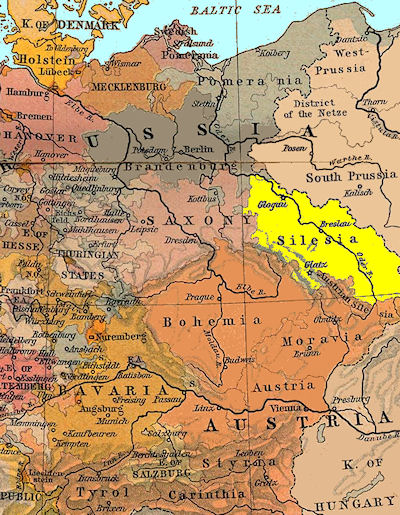1945-2005 - Upper Silesia
The constant shifting of Silesia between Polish and German control during several centuries created a unique ethnic amalgam and regional self-consciousness. Whatever the original ethnic composition of the region, the Silesians themselves developed a separate culture that borrowed liberally from both Polish and German. The predominant spoken language is a heavily Germanized dialect of Polish.
At the end of World War II, Upper Silesia, formerly the chief source of coal for Berlin, had been transferred to Polish control and was no longer part of Germany. The British and Americans had expected to get food for their zones from the primarily agricultural eastern zone, and not to have to ship it there, and neither the United States nor the United Kingdom had recognized the Soviet transfer of Upper Silesia to Poland.
Upper Silesia, sometimes called "Black Silesia", ranks as one of Europe's most crowded regions constituting 2.1 percent of Poland's total area, but containing about ten percent of its population (about four million people), and producing seventeen percent of the Gross Domestic Product. The high concentration of population and industry has resulted in a standard of living much below those of Poland's other regions and other comparable European cities. In 1991, Upper Silesia was designated as the worst of five official disaster areas in Poland. It was observed that public health indicators such as infant mortality, circulatory and respiratory disease, lead content in children's blood, and incidence of cancer were uniformly higher than in other parts of Poland. While air pollution is probably not the only cause of health problems in the Upper Silesia region, the region boasts 50% more respiratory problems than the Polish average and is generally considered to claim one of the poorest health records in Europe. Upper Silesia is recognized as the second- most polluted area in the world behind the northwest corner of the Czech Republic.
Although the Silesians retained close traditional ties with their locality and their own group, in the early 1990s they could not ignore the difference between their standard of living and that of nearby Germany. Many non-German Silesians very likely declared themselves ethnic Germans to receive preferential treatment from the German government; this practice played a major role in the diversity of minority population estimates.
Some Silesians were bitter over the resettlement policy of the postwar communist governments and other forms of anti-German discrimination. Immediately following the end of Polish communist rule, a well-organized German faction in Silesia demanded that dual citizenship and other privileges be guaranteed the German minority in Poland by the forthcoming Polish-German friendship treaty (see Foreign Relations , ch. 4). In this demand they were joined by German citizens who had been expelled from the German territory awarded Poland after World War II. Ratification of the Polish-German treaty of friendship and cooperation in 1991 blunted the impact of radicals, however, and promoted pragmatic local cooperation rather than confrontation between Poles and Germans in Silesia.
Postcommunist Polish governments established no firm criteria for proving German nationality; in most cases, oral declarations were accepted as sufficient proof. Beginning in 1989, the Social Cultural Association began propagating German culture in Silesia. By 1992 the group had initiated German instruction in 260 schools, stocked libraries with German materials, and arranged technical instruction in Germany for Silesian health and education workers. The special ties with Germany make Opole one of the most prosperous regions in Poland; the Silesian Germans provide important resources to the local economy, and the lifestyle of many Silesian communities resembles that of Germany more than that of Poland. Although many non-German Silesians feared that the spread of German economic and cultural influences would erase the unique ethnic qualities of their region and the idea of German dominance retained some negative historical associations, in the early 1990s postcommunist aspirations for the prosperity promised by German connections remained an important factor in public opinion on the German ethnic issue.

|
NEWSLETTER
|
| Join the GlobalSecurity.org mailing list |
|
|
|

